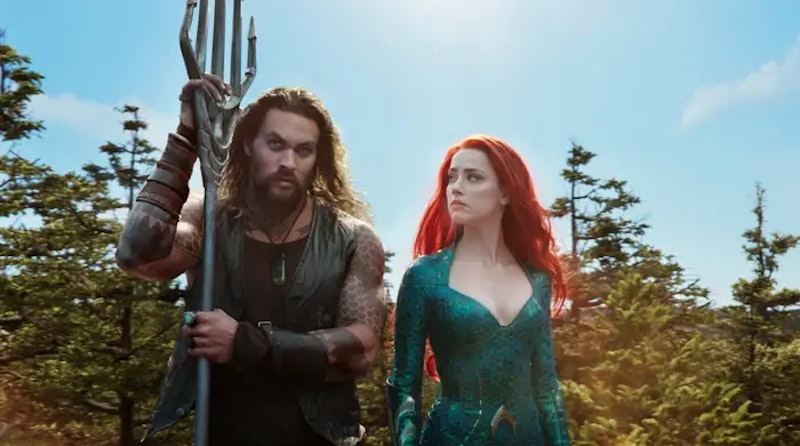And so, perhaps fittingly, the DC Extended Universe a.k.a. the DCEU—the specific version of the DC Comics superhero multiverse that, roughly speaking, has existed for the past decade on the big screen (in the form of Henry Cavill’s Superman et al), TV (in the form of the numerous CW superhero shows), and the printed page (mainly in the form of the “New 52” era of DC Comics)—ends in the mid-credits scene of Aquaman and the Lost Kingdom with a naïve, satisfied man eating a cheeseburger that has a cockroach in it. It’s like a nightmare inversion of the pleasant final scene of Whit Stillman’s Barcelona.
Which of those two scenes required more thought and effort to produce may be the great artistic question of our age.
David Zaslav, head of DC’s parent company Warner Bros./Discovery, has been much criticized over the past couple of years for his slash-and-burn approach to reducing Warner’s costs and debt. However, he’s not wrong to think that in order to survive the company needs to rid itself of multiple billion-dollar albatrosses and focus on a few high-quality projects—even, or perhaps especially, if the real goal is just to make Warner look like an inviting merger partner for an outside entity such as Paramount (which would give the combined company access not only to DC’s superheroes but to Star Trek, itself an ailing franchise, as I wrote two weeks ago) or NBCUniversal (which would hypothetically allow classic Universal monsters such as the Wolfman to mingle with DC’s Creature Commandos, the latter team one of the top priorities of current DC Universe creative honcho James Gunn).
In short, given the need to reorganize, maybe another brutal round of layoffs at DC Comics (for which several friends and I have done work over the years) and accompanying reset of their fictional continuity wouldn’t be so crazy, though DC Comics itself, the actual printed comics division, is hardly the most expensive part of the Warner empire.
In any case, as people half-jokingly ponder what a fused Warner-HBO-Cinemax-Paramount-etc. behemoth might be called, I, with my usual marketing savvy, humbly suggest Paramax, which is fairly short—and has the added virtue of sounding a bit like the name of a Green Lantern villain who destroyed the universe once a few decades back.
Another ironic option, given that Paramount’s parent company is called National Amusements, would be to change the name of DC Comics back to National Periodicals, which is what the operation was called back when Superman debuted in the 1930s. “DC,” adopted later, technically stands for Detective Comics, just in case anyone doubted the longstanding centrality of Batman in all this. (Wayne Enterprises would also have a ring to it, as would Starfleet.)
If all else fails, maybe Gunn could work out an arrangement to make all the aforementioned companies subsidiaries of his old pals at Troma Entertainment, the tiny New York studio responsible for such low-budget yet profitable schlock as the original Toxic Avenger. Both “Toxic” and “Avenger” seem like they’d be good attention-getting words in the current branding/political environment.
I’ve met a few New York performance artists who are friends of the Troma crowd, and they seem to spend a lot of time stoned or naked, unsurprisingly. Give all the Warner-etc. assets to them, if they’re willing to work out how to handle all the debt, and something interesting is bound to happen. Maybe they’ll finally put anarchist and veteran DC Comics writer Grant Morrison in charge of everything—or for added fun, make him and anarchist comics writer Alan Moore co-presidents. What harm could it do at this point?
After all, it was staid, ostensibly rational, moderate-liberal, respectable, corporate types, with neckties and tight schedules, who decided to hang Warner’s fate on such stable, reliable, easygoing personalities as Ezra Miller, Amber Heard, and Dwayne Johnson. (While their corporate rivals over at Marvel gave us that Kang actor—and also now likely want to avoid putting that actor who played Deadpool’s bartender in the MCU proper, and avoid putting Wesley Snipes and Halle Berry in the same room even if they bring both back for cameos in Avengers: Secret Wars.)
Maybe the real problem with the superhero biz lately isn’t varying individual personalities, such as the crazies mentioned in the preceding paragraph, or even specific bad artistic decisions, so much as the fact that bureaucracies are as bad at fostering rationality as they are at fostering art—despite what a century of post-Max Weber social theorizing has taught us to believe.
Looking at these giant, hulking, corporate wrecks—like the ruins of once-great Atlantis (or, in the slapdash mythos of the mediocre Aquaman and the Lost Kingdom, perhaps I should say the dying undersea kingdom of Necrus)—I think the more bizarre auteurs who go their own way and do something that doesn’t rely upon checking with corporate headquarters or swearing allegiance to the Black Trident, the better off we’ll probably be.
Leave the corporate folk to focus not on merging fictional universes but on their increasingly desperate financial merger ideas, the artists sailing quietly away while the bureaucrats sink slowly beneath the waves.
—Todd Seavey is the author of Libertarianism for Beginners and is on X at @ToddSeavey

